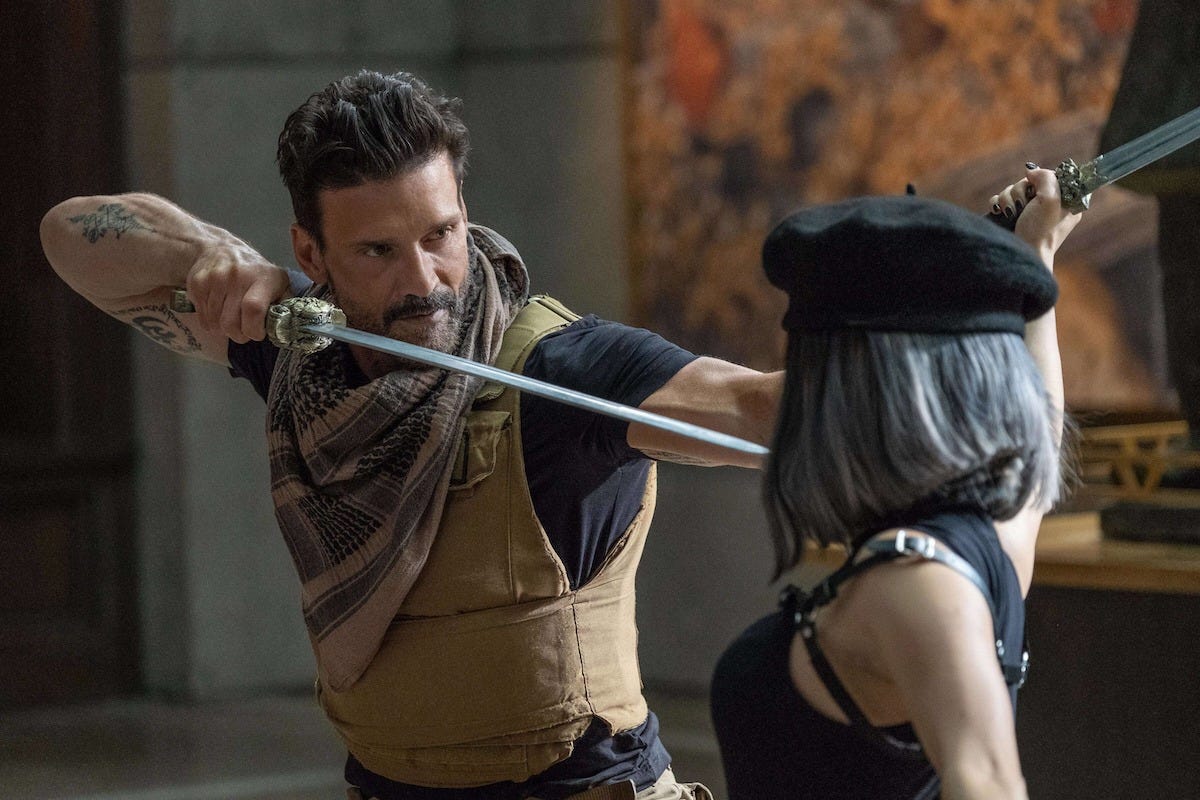Let a Thousand Film Markets Bloom
Less overlap between Chinese and U.S. film tastes would be good. Plus: 'Boss Level,' reviewed!
It’s hard to find optimism when it comes to the world of film in the age of COVID. But let me focus on the woes of Disney for a moment to suggest one way in which things might improve somewhat after all this comes to an end.
On the one hand, Disney seems to have weathered the pandemic better than most thanks to the incredibly successful launch of Disney+, which now has over 100 million subscribers worldwide. On the other, though, the House of Mouse is struggling in the only film market that is open and booming right now: China.
The first sign of trouble was the live-action Mulan flopping horribly in the Middle Kingdom following stateside controversy about Disney thanking the governmental agency running Uighur concentration camps in China. Following the flop of Mulan was the flop of Raya and the Last Dragon, which pulled in an abysmal $8.4 million in its opening weekend. Meanwhile, Disney finds itself in a pickle thanks to the fact that Chloé Zhao—the China-born indie director of its forthcoming MCU tentpole, The Eternals—is persona non grata in China right now.
This last issue may be the trickiest to navigate.
“Marvel has become the most valuable entertainment IP in China,” said Chris Fenton, author of Feeding the Dragon: Inside the Trillion Dollar Dilemma Facing Hollywood, the NBA, & American Business. “The CCP could keep Disney uncomfortably off-balance with how to play Chloé’s involvement in their upcoming Eternals release. Big money on the line, and it’s not clear whether this controversy will blow over via a simple apology.”
While American films that normally would’ve gone gangbusters are flopping, Chinese films are excelling, putting up record numbers. But those films don’t really travel overseas, doing modest business outside of China. And if American films don’t play as well in China, the billion-dollar-Hollywood-blockbuster becomes, if not quite a thing of the past, then a much rarer occurrence.
Which brings me to the possible improvement in the filmmaking world post-pandemic: We may see a return to a business where mid-budget movies aimed at American adults rather than mega-budgeted monstrosities aimed at foreign teens have room to grow. If you can’t count on $300 million from China, you have a hard time justifying a $300 million budget, period. But a combination of factors—the diminution of the Chinese box office; reduced advertising costs as studios shift from expensive TV buys to cheaper-and-smarter social media purchases—means that it might start making sense to target those folks who are looking for something a bit better than your standard spandex fare.
And look: I like big-budget superhero movies. I don’t think they’re going away entirely and I don’t want them to go away entirely. But it would be nice if they were a less-dominant mode of the cinematic experience, if we could get back to the adult dramas and the thrillers and the R-rated action movies that have become more difficult to justify because the market is crowded with bigger-budget PG-13 fare.
In short: A world in which Chinese filmmakers make films for Chinese audiences and in which American filmmakers make films for Western audiences isn’t the worst thing that could happen.
If you enjoy this newsletter, make sure to check out our podcasts! Every Tuesday brings Across the Movie Aisle, which I host alongside Alyssa Rosenberg of the Washington Post and Peter Suderman of Reason magazine. It’s “Left, Right, and Center” crossed with “Siskel and Ebert,” I think you’ll dig it. And on Thursdays we have episodes of The Bulwark Goes to Hollywood, in which I engage in longform interviews with someone who knows something about the business of Hollywood. And don’t forget A French Village Podcast, featuring Sarah Longwell and Benjamin Wittes! There’s something for everyone here at Bulwark+, and it’s a fantastic bargain at just $10 a month.
Review: Boss Level
During this eternal lockdown, where one day rolls into another as you stare at the walls of your apartment while your dog watchfully protects you as your cat tries to decide when it can eat your eyes after you catch the plague and die, Hulu has emerged as the patron of the Cinema of Sameness.
I don’t mean sameness in the sense of everything being the same, of big budget CGI cookie-cutter silliness. I mean sameness as in things being the same, every day, with no exit in sight. First, Hulu picked up Palm Springs, Andy Samberg’s delightful comedy about a guy stuck in a desert resort trapped in an eternal time loop. It was the perfect movie for a very strange moment, a visual reminder of the national mood.
Last Friday Hulu dropped Boss Level, Joe Carnahan’s action-movie riff on the Groundhog Day concept. Starring Frank Grillo as Roy Pulver, a former special operations guy who wakes up every day when a stranger tries to kill him with a machete. The guy with the machete is succeeded by the guy with a chain gun in a helicopter, who is followed by a woman toting Hitler’s personal pistol, who is followed by an Irish dwarf who likes explosives, who is followed by a Chinese assassin with a penchant for lopping off heads. Oh, and there’s the redneck with the grappling hook to avoid, and a pair of black German twins who mean business.
Every time he dies, he wakes, only to do the whole thing over again. He’s stuck in a time loop thanks to his former girlfriend and baby mama Jemma (Naomi Watts), a scientist who leaves clues for Roy to unravel as he tries to figure out what, exactly, is going on. What little respite he finds comes in an underground oasis of a bar managed by Jake (Ken Jeong), where Roy goes to get blitzed before being blown away and/or blown up. Roy struggles, he self-medicates, he questions his fate, and then he wakes up and does it all again, exactly the same. Nothing changes for him because nothing can change. He’s trapped.
Sound familiar?
Hopefully it doesn’t; hopefully you’ve settled into a good place during the pandemic, one that allows you some modicum of freedom, some slight differences from day to day while you wait for the end of all this. I am, frankly, fortunate to be where I’ve settled, in the home in which I live, with a loving family. I know of too many people who are struggling with loneliness, with depression, with chemical dependency to feel much in the way of self-pity.
Boss Level called to mind these folks and the worry I feel for them, even as vaccinations speed up and schools reopen and the basics of life—like movie theaters, which I would’ve loved to have seen this in—get rolling again. Apologies if this is maudlin, I know you just came here to find out if the kills in Boss Level are amusing (they are; I’d love to know how much of the budget was spent solely on having Grillo decapitated repeatedly, in loving close-up) and if Mel Gibson is good in it (he is, though he’s kind of wasted; he’s fine as the villainous Col. Clive Ventor, but there’s very little for him to work with here).
In the end, what saves Roy isn’t booze or pills or bullets or bombs. It’s family. That’s what pulls him out of his funk, what gives him reason to live. The idea of needing someone else, the idea of having someone to protect. I’m not going to sit here and tell you that Boss Level is a great meditation on love and loss; this is Carnahan, not Tolstoy. But it is slightly deeper than the elevator pitch might make it sound.
Note: This is not intended as a knock against Carnahan, whose work I generally enjoy. Narc is one of the most-underseen films from the early-’00s indie boom, The Grey is a genuine masterpiece of mid-budget action cinema, and Smokin’ Aces and Stretch are stuffed with wonderfully manic performances by genuinely great actors, even if they don’t entirely work as pieces of storytelling. Boss Level has the manic energy of those films but is a much tighter, more compelling work. It’s not high art, but it is fun.
And, if you’re willing to get on its level, perhaps even moving.
Assigned Viewing: Man of Steel (HBO Max)
GOOD NEWS PEOPLE: We are less than one week away from the release of the Snyder Cut of Justice League! To prepare yourself for what will surely be one of the most momentous days in the history of cinematic streaming, you should refresh yourself by taking a look back at Man of Steel.
I’ve previously assigned Batman v. Superman: Dawn of Justice: Ultimate Edition. But you really need to look back at the first film from the so-called DCEU to understand why folks have been waiting for this. It’s the only good cinematic representation of Superman, a god-like being whose overpowered nature innately keeps him distant from humanity. By forcing Superman to question whether or not he should reveal himself—and then answering that question by requiring him to save the world from what amounts to an evil version of himself—Snyder and Christopher Nolan, who received a story credit along with David Goyer, give Clark Kent/Kal El a far more interesting position on Earth than that of Boy Scout savior.







